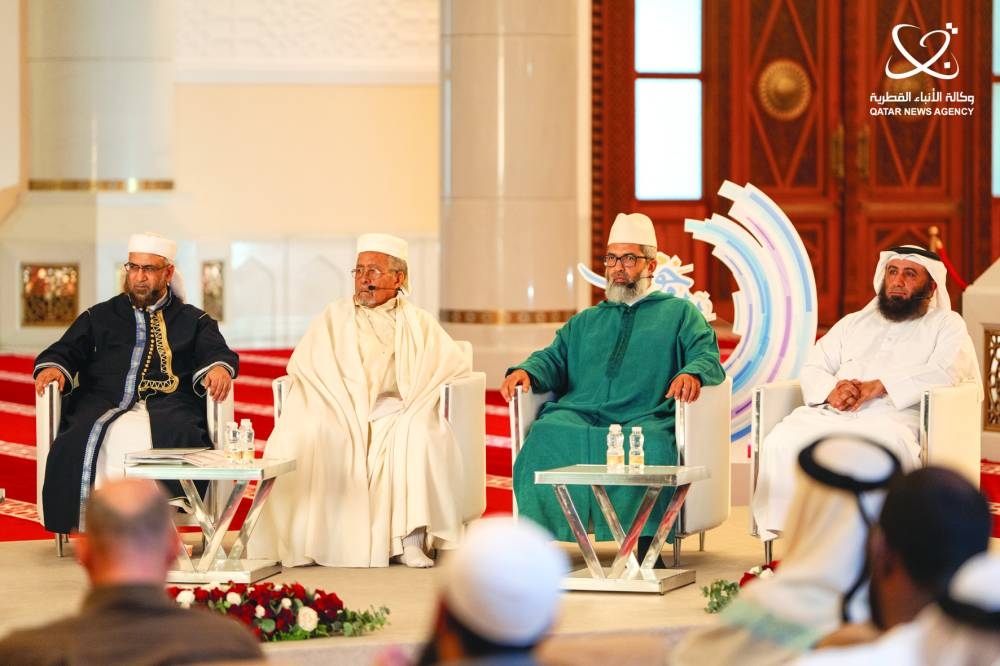The second episode of the Ramadan talk show 'Wa Amenhum mein Khawf' (secure them from fear), organised by the Ministry of Endowments (Awqaf) and Islamic Affairs and represented by the Department of Da'wah and Religious Guidance, discussed the role of families in building tight-knit communities.
The episode highlighted the foremost factors of successful families, along with the most significant errors to which spouses are prone, potentially exerting a detrimental impact upon their conjugal life.
Moderated by Dr Yahya Butti al-Nuaimi at the Imam Muhammad ibn Abd Al Wahhab Mosque in Doha, the episode, entitled "Muslim families are the cornerstone of sound societies", deliberated on the most significant merits that endure sound families and make them incubators of compassion and mercy.
It also tackled other behaviours pursued by some families that have caused the surge in divorce rates due to pursuing weird mores and behaviours in the community.
The ministry's preacher, His Eminence Dr Mohammad al-Mahmoud, underscored the importance of carefully addressing family matters to rectify the errors and to urge those who pursue decent traits and virtues to maintain these tenets, stressing that families are the bedrock of the community, as when it thrives in righteousness, society prospers accordingly.
Conversely, when the family unit becomes corrupted, it will have domino effects within society, ultimately resulting in the proliferation of moral decay, Dr al-Mahmoud highlighted.
Citing the Prophetic Hadiths in this regard, he emphasised that families must be founded upon religion, and once this foundation is secured, all subsequent matters will be sound.
He affirmed the principle of "qiwamah", the guardianship and responsibility of men over women as ordained in Islam, stressing that any disruption of this divinely prescribed order leads to serious disorder. He stressed the necessity of granting each authority its rightful jurisdiction and responsibilities.
For his part, Professor at the College of Sharia and Islamic Studies at Qatar University, Dr Abdul Salam al-Majidi, highlighted the models of successful families based on verses from the Holy Qur'an.
He addressed family life between husband and wife, recalling the story of Adam and Eve, indicating that it is the man who bears the burden, just as he is the one to take the lead in the distribution of benefits.
Dr al-Majidi cited the model of the successful family, that of Prophet Abraham, in which the ideals of a prosperous family are fully exemplified.
Member of the Association of Muslim Scholars in Algeria, Dr Abdul Razzaq Qassoum, said that the culture of families is the core determinant of their configuration, emphasising that these determinants create the foundations that imbue the family with a sense of social, cultural and civilisational belonging.
Religious doctrine is situated within the context of these core precepts and determinants, serving to forge a robust relationship between humans and the element of faith, Dr Qassoum highlighted, noting that these two parallel trajectories culminate in a harmonious integration, ultimately striving towards the creation of a more enlightened and cohesive human society.
He explained that the Muslim family is significantly founded upon the husband, the wife, and the children, underlining that a fundamental support and guarantor of the Muslim family is the marriage contract.
He further noted that, in contemporary society, the Muslim family faces distorted ideologies, notions, and terminologies that have permeated human society, adversely impacting the development of the individual.
The thinker and academic at the Morocco Education and Training Centre, Dr Al-Bashir Essam al-Marrakchi, asserted that correct religious discourse maintains families from disintegration, as both men and women have their respective roles and responsibilities.
He emphasised that it is imperative for both men and women to remain within the bounds of their distinct characteristics, noting that families are not solely based on love, as commonly perceived by youth, but are grounded in affection and respect.

